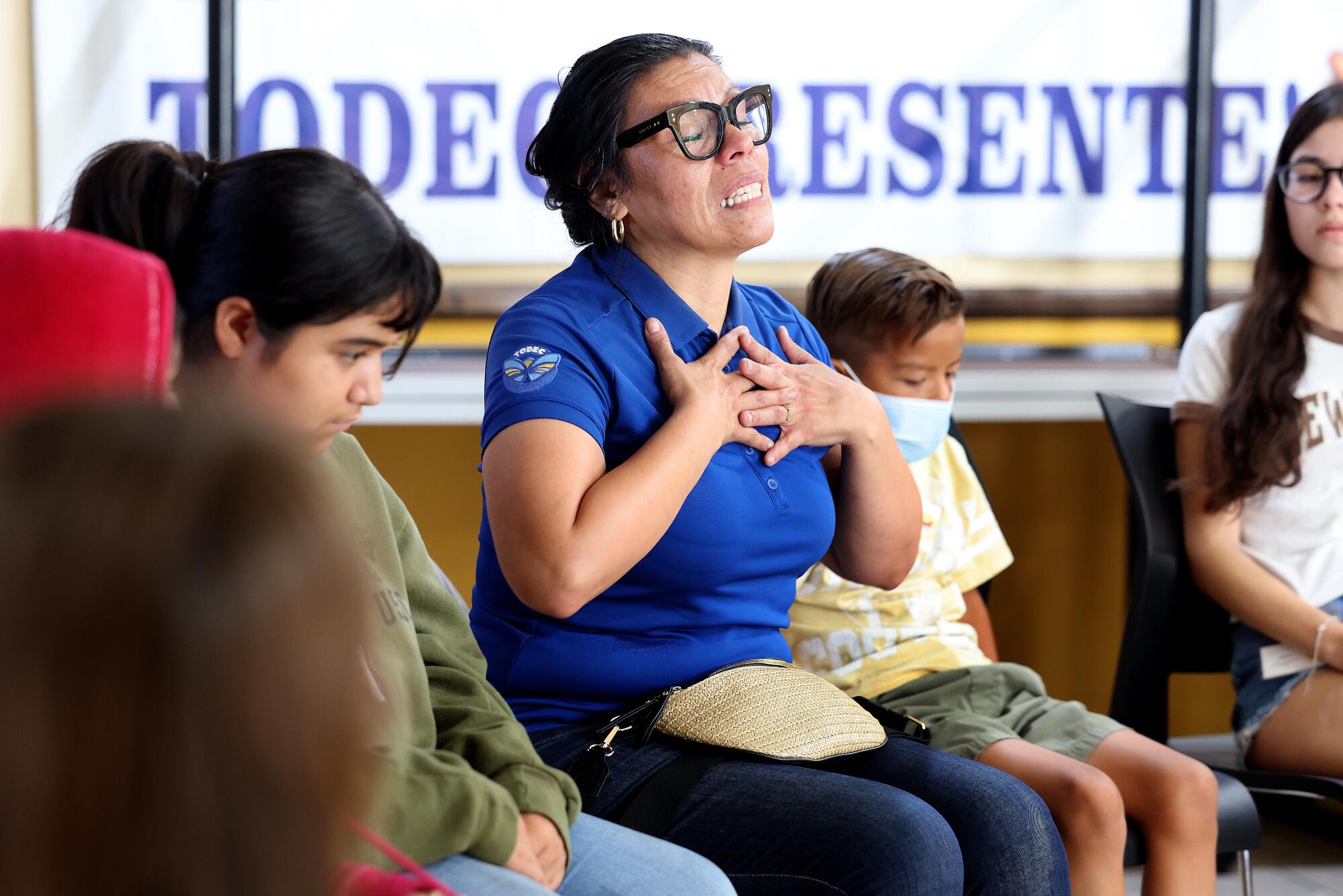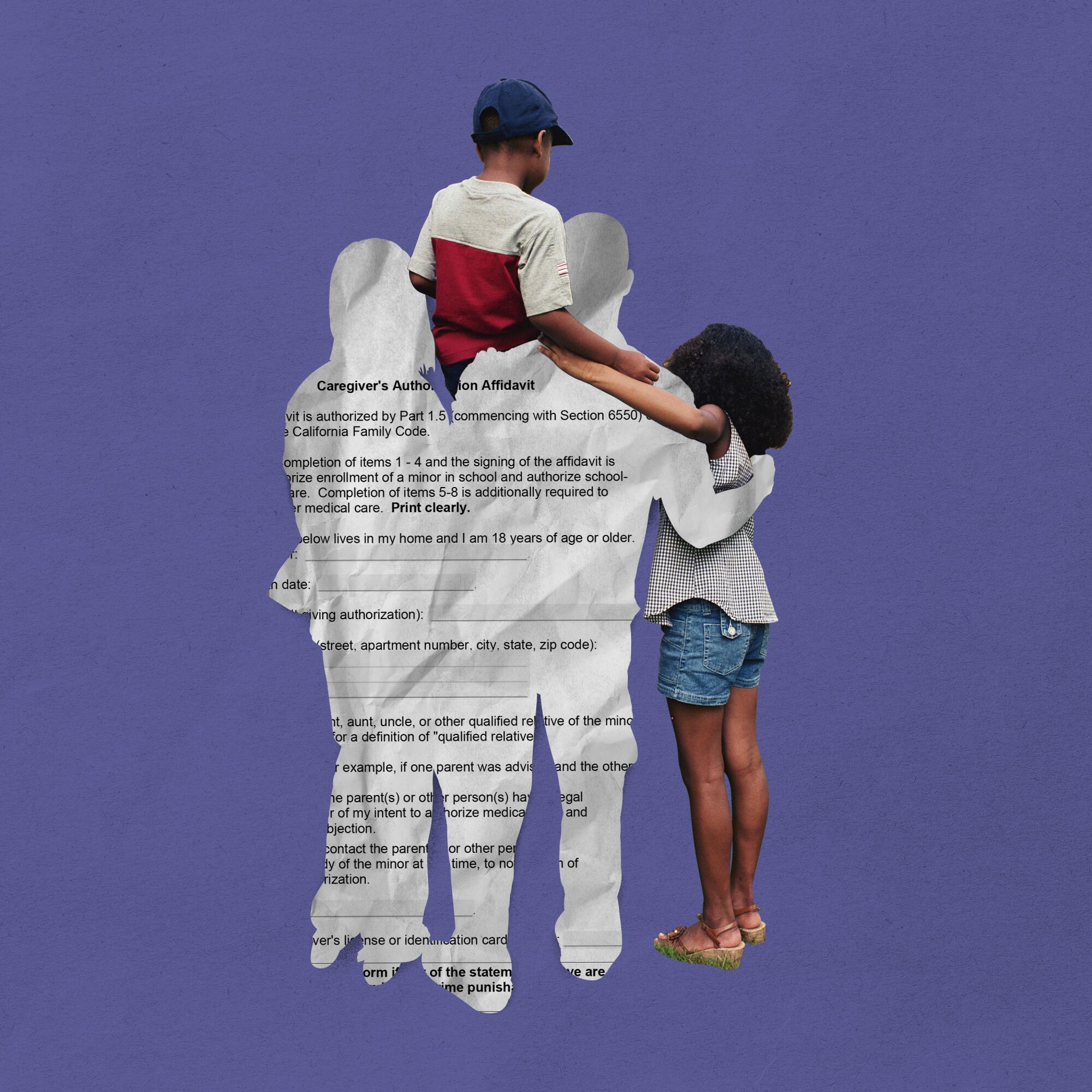-
Man and woman found dead with gunshot wounds in Encino home - 9 mins ago
-
The Biggest Changes in Fortnite’s 36.20 Update - 12 mins ago
-
Vegas visitors shocked by resort prices, plus restaurant surcharge stirs controversy - 16 mins ago
-
2025 NBA Summer League Odds: Sacramento Kings’ Championship Futures Surge - 39 mins ago
-
Sandy Alcántara To Padres? Why Latest Trade Rumors Make No Sense - 52 mins ago
-
How do you stop an AI model from turning Nazi? What the Grok drama reveals about AI training. - 55 mins ago
-
Thousands of Afghans were resettled in Britain after a data leak put them in danger - about 1 hour ago
-
Government Urges EU to Strike Tariff Deal with U.S. within Two Weeks - about 1 hour ago
-
2025 MLB All-Star Game: What Was Happening The Last Time The Braves Hosted? - about 1 hour ago
-
Millennial Mom Panics Kids Will Turn Out Like Her—Then She Sees Teenage Son - 2 hours ago
What happens to kids when parents are deported? These families are making plans
Sonia’s son has been anxious lately, crying and asking why their neighbor had been picking him up from preschool instead of his mom. She doesn’t know what to tell him. At just 4 years old, he’s too young to understand the truth.
Sonia has lived in the U.S. without legal status for 25 years, harvesting squash, cilantro and tomatoes in the fields of Riverside County. But she can no longer risk leaving her house to pick up her child for fear of being detained or deported by federal agents.
She has begun preparing for something far worse than a missed pickup — the possibility that their separation could become permanent.
A woman receives help with filling out a caregiver authorization affidavit at TODEC Legal Center in Perris.
Last week, Sonia visited the offices of TODEC, a legal center in the Inland Empire serving immigrants and farm workers, to fill out the forms that will allow her sister to take over the care of her three American citizen children — ages 4, 7, and 10 — in the event that she and her husband are deported. “I already want to cry,” said Sonia, who requested that her full name not be used to protect her.
Since June 6 — when the Department of Homeland Security began widespread raids throughout the Los Angeles region — the number of immigrant parents making emergency arrangements for their children’s care has skyrocketed. Parents have flooded legal rights organizations in person and on Zoom for help filling out the forms that will designate another adult to take over responsibility of their children, many of whom are citizens, if they are detained or deported.
Engage with our community-funded journalism as we delve into child care, transitional kindergarten, health and other issues affecting children from birth through age 5.

Program manager Sandra Reyes, center, helps two mothers fill out a caregiver authorization affidavit at TODEC Legal Center in Perris.
An estimated 5.62 million American children have an undocumented household member, and nearly 2 million of them are under the age of 6. More than half of these children do not have a parent with legal status, according to a report from the Brookings Institution.
It is not clear how many parents have been detained or deported during the recent raids. Since 2018, however, about 60,000 parents of U.S. citizen children have been deported, according to data provided by ICE. Data on what happened to their children isn’t readily available, but those who were American citizens most commonly stay in the U.S. if only one parent is deported, said Tara Watson, who directs the Center for Economic Security and Opportunity at Brookings.
Parents who are detained by ICE are “asked if they want to be removed with their children, or ICE will place the children with a safe person the parent designates,” Department of Homeland Security Assistant Secretary Tricia McLaughlin said in a statement. “DHS takes its responsibility to protect children seriously and will continue to work with federal law enforcement to ensure that children are safe and protected.”
McLaughlin said that parents in the country illegally “can take control of their departure” with a the CBP Home Mobile Application, an app with services provided by U.S. Customs and Border Protection.
“The United States is offering illegal aliens $1,000 and a free flight to self-deport now,” McLaughlin said. “We encourage every person here illegally to take advantage of this offer and reserve the chance to come back to the U.S. the right legal way to live the American dream. If not, you will be arrested and deported without a chance to return.”
Some families choose to take their children with them to their country of origin. One study estimated that from 2014-2018, there were 80,000-100,000 U.S. citizen children in Mexico as the result of parental deportation.
Making a family preparedness plan

Executive Director Luz Gallegos, center, gets emotional while speaking to children about their love for their families at TODEC Legal Center in Perris.
(Christina House / Los Angeles Times)
Legal advocacy groups in California are encouraging families to prepare for the possibility of separation and are helping parents fill out the requisite forms that designate another adult to care for their children in their absence. Although some want to shift legal guardianship to another adult, that process can take several months, requires a judge’s approval, and involves giving up their parental rights.
Many more are instead filling out a simple form called a “Caregiver’s Authorization Affidavit” that permits another adult to enroll their child in school and authorize medical care.
Demand for help filling out these affidavits has increased exponentially.
What used to be the occasional workshop for 20 parents has become a regular series of Zoom and in-person meetings that have reached more than a thousand, said Andres Cifuentes, an attorney at Bet Tzedek Legal Services, a nonprofit law firm in L.A.
“We’ve heard about children having nightmares about the possibility of being separated,” he said. “We encourage parents to have this conversation in a very calm manner as if preparing for an earthquake or a flood.”

Executive Director Luz Gallegos is photographed at TODEC Legal Center in Perris. Gallegos’ parents, who were farmworkers and organizers, founded the organization in the early 1980s.
Luz Gallegos, executive director of TODEC, said most people are seeking help virtually because they are too afraid to leave their homes. And it’s not just an influx of parents who are living in the country without legal status. For the first time, Gallegos said TODEC is seeing parents with DACA, green cards holders, and even naturalized citizens preparing for possible deportation.
TODEC also runs a youth leadership and development program for the children of immigrant parents called “Monarcas Luchadoras,” where they are learning how to help their families create preparedness plans and packing groceries for members of the community who are too afraid to leave their houses right now.
Selecting a caregiver in case of deportation
TODEC recommends that parents pick someone who has citizenship or legal permanent residency, so they are not at risk. Gallegos said she has personally been asked by so many families to serve as caregiver that she has lost count. “I feel like if you say yes to one, you have to say yes to all of them.”
Instead, she tries to help parents think through their safety nets. Many families end up selecting teachers, child-care providers or people from their faith communities, rather than family members who are also likely to be immigrants.
Susan, an immigrant from Guatemala who lives in L.A., has been a nanny for 18 years. She has a strong community of other immigrants but asked her former employer whose child she cared for during the pandemic and who is white, to be her three children’s caregiver if she is deported. Susan requested that her full name not be used to protect her.
“I know that her and her husband’s word will be respected,” Susan said. “If a Guatemalan citizen goes to fight for my children, obviously their rights won’t be respected.”
Susan, who is in her 30s, has lived in the U.S. for half her life, and her husband has been here for 30 years. During the pandemic they were essential workers, she said, providing child care, cleaning houses and doing construction. “And now we are criminals,” she said.
Signing the caregiver forms was “one of the most difficult decisions that I’ve had to make as a mom, because I feel like I am giving away my children. But I don’t want them to be taken by the government if I have to go with immigration.”
But parents like Susan “understood that they were in the country illegally, and that this could potentially happen,” said Ira Mehlman, spokesperson for the Federation for American Immigration Reform, which favors stricter immigration controls. “It is unfortunate that the kids are put in this situation, but like any other parent, they are responsible for the consequences of their decisions on their kids.”
He said parents of U.S. citizen children should not be given special leniency for exemptions from deportation. Mehlman favors the elimination of birthright citizenship, which President Trump called for in an executive order. A federal judge last week prohibited the order from taking effect anywhere in the U.S.
The impact of parents’ deportation on children

(Photo illustration by Jim Cooke / Los Angeles Times; Photo via Getty Images)
Numerous studies have found that the deportation of a parent can have a profound impact on a child, including long-term developmental and behavior issues, depression and academic decline.
“Following deportation of a family member, children demonstrate numerous emotional and behavioral challenges, such as eating and sleeping changes, anxiety, sadness, anger, and withdrawal,” according to a 2018 policy statement from the Society for Community Research and Action, a division of the American Psychological Assn. “Even if the family is ultimately reunited, the consequences of their forced family separation often remain.”
For very young children in particular, separation from a parent is “tremendously traumatizing,” said Sherry Berg, a clinical psychologist at Para Los Niños, which runs seven Head Start programs in Los Angeles County. Separation anxiety — the fear of being separated from the primary caregiver and something happening to them — is a normal part of early childhood development; a parent’s actual deportation is “their worst nightmare.”
Sara, a Guatemalan immigrant from South-Central L.A., said she is thinking of self-deporting with her 9-year-old son, who is a citizen. They haven’t left their apartment in weeks, except for the occasional errand to a grocery store and a quick trip to the post office to secure a passport for him.
Her son does not want to move to Guatemala, a country he’s never been to. “What he’s told me is that in October when classes start, then hopefully the raids will have calmed for school,” said Sara.
In Riverside, Sonia said she’s tried to shield her 4- and 7-year-old children from what is happening. But her 10-year-old has been asking about what’s going to happen to his family.
“Before summer vacation, the teacher called me and told me that she was going to have him evaluated, so that they could give him psychological help because he is very anxious,” she said.
Both she and her husband are from Michoacan, Mexico, a state fraught with drug cartel violence. She said they fear the conflict there, and work is hard to come by. If only one of them is deported, the other will stay in the U.S. to raise the children. If both are deported, she wants her children to stay in the U.S., where they are safe and have opportunities — at least until the parents figure out whether they can make a new life for the family in Mexico.

Children attending “Monarcas Luchadoras,” a youth leadership and development program, help pack food deliveries for people in their community who are afraid of leaving home to get groceries because of ICE.
Undocumented children whose parents are deported often stay under the radar by going to live with other family members, said Watson said. But those who come under the purview of ICE are often transferred to the Office of Refugee Resettlement, which may place them in institutional settings while looking for a sponsor.
Maria, a home child-care provider in Highland Park with 20 years of experience, said she was recently asked by the mother of an undocumented 11-year-old at her day care if she would be willing to adopt her — permanently.
“I could feel her pain. She was saying, ‘She’s going to be yours. I’m not going to ask for her back,” said Maria, who requested that her full name not be used to protect her. “I was speechless. It was a very drastic decision.”
The mother was from Honduras, where her nephew was recently murdered, and she was terrified for her daughter’s safety, Maria said. “I could see her fear in her eyes and her tears.”
Maria had been caring for the girl for five years, and agreed to see a lawyer to discuss the options. But before they were able to go, she said the mother and child were picked up by federal agents.
“I was heartbroken,” Maria said. “I would have adopted her.”
This article is part of The Times’ early childhood education initiative, focusing on the learning and development of California children from birth to age 5. For more information about the initiative and its philanthropic funders, go to latimes.com/earlyed.
Source link































